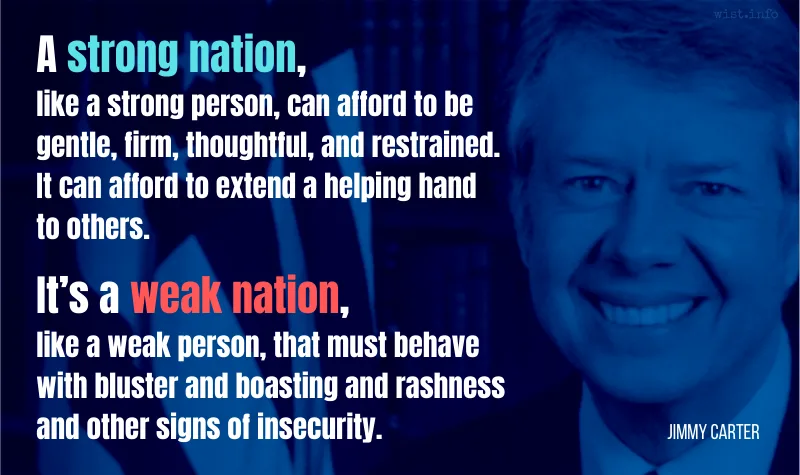We have a tendency to condemn people who are different from us, to define their sins as paramount and our own sinfulness as being insignificant.
Jimmy Carter (b. 1924) American politician, US President (1977-1981), Nobel laureate [James Earl Carter, Jr.]
“A Statesman And a Man Of Faith,” interview by Don Lattin, San Francisco Chronicle (12 Jan 1997)
(Source)
Quotations by:
Carter, Jimmy
A strong nation, like a strong person, can afford to be gentle, firm, thoughtful, and restrained. It can afford to extend a helping hand to others. It’s a weak nation, like a weak person, that must behave with bluster and boasting and rashness and other signs of insecurity.
Jimmy Carter (b. 1924) American politician, US President (1977-1981), Nobel laureate [James Earl Carter, Jr.]
“Warm Hearts and Cool Heads,” speech, Liberal Party dinner, New York City (14 Oct 1976)
(Source)
The title of the speech was from a phrase coined by Adlai Stevenson.
On human rights, civil rights and environmental quality, I consider myself to be very liberal. On the management of government, on openness of government, on strengthening individual liberties and local levels of government, I consider myself a conservative. And I don’t see that the two attitudes are incompatible.
I had applied for the nuclear submarine program, and Admiral Rickover was interviewing me for the job. It was the first time I met Admiral Rickover, and we sat in a large room by ourselves for more than two hours, and he let me choose any subjects I wished to discuss. Very carefully, I chose those about which I knew most at the time, current events, seamanship, music, literature, naval tactics, electronics, gunnery and he began to ask me a series of questions of increasing difficulty. In each instance, he soon proved that I knew relatively little about the subject I had chosen.
He always looked right into my eyes, and he never smiled. I was saturated with cold sweat.
Finally, he asked a question and I thought I could redeem myself. He said, “How did you stand in your class at the Naval Academy?” Since I had completed my sophomore year at Georgia Tech before entering Annapolis as a plebe, I had done very well, and I swelled my chest with pride and answered, “Sir, I stood fifty-ninth in a class of 820!”
I sat back to wait for the congratulations, which never came. Instead, the question: “Did you do your best?” I started to say, “Yes, sir,” but I remembered who this was and recalled several of the many times at the Academy when I could have learned more about our allies, our enemies, weapons, strategy, and so forth. I was just human. I finally gulped and said, “No, sir, I didn’t always do my best.”
He looked at me for a long time, and then turned his chair around to end the interview. He asked one final question, which I have never been able to forget or to answer. He said, “Why not?”
I sat there for a while, shaken, and then slowly left the room.
War may sometimes be a necessary evil. But no matter how necessary, it is always an evil, never a good. We will not learn how to live together in peace by killing each other’s children.
Jimmy Carter (b. 1924) American politician, US President (1977-1981), Nobel laureate [James Earl Carter, Jr.]
Nobel Peace Prize Lecture (10 Dec 2002)
(Source)
A simple and a proper function of government is just to make it easy for us to do good and difficult for us to do wrong.
You can’t divorce religious belief and public service. I’ve never detected any conflict between God’s will and my political duty. If you violate one, you violate the other.
Human rights is the soul of our foreign policy, because human rights is the very soul of our sense of nationhood.


